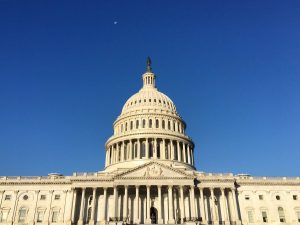
US Capitol building. Photo courtesy of @USCapitol.
Colombia has remained a solidly bipartisan issue in the US Congress. However a change in party also means a change in priorities. As a result of the US midterms this week, Democrats in Congress are likely to demand further accountability from President Iván Duque on issues such as human rights, transitional justice and the implementation of the peace agreement.
On November 6th approximately 114 million Americans voted in the US Midterm elections–a record turnout. Although the election focused mostly on domestic issues such as healthcare, immigration, and the economy, it also has huge implications for President Donald Trump’s presidency.
 The elections, which were branded as a referendum on Donald Trump – a claim he made himself – drew record numbers of voters for a mid-term election. 114 million Americans voted yesterday; a significant number when compared to the 83 million who voted in 2014. As the election results are nearly final, the opposition Democratic party took over the majority in House of Representatives (Lower House) with 219 seats out of 435 and possibly a few more gains. However, the ruling Republican Party still hold control of the Senate (upper house) with over 51 seats out of 100.
The elections, which were branded as a referendum on Donald Trump – a claim he made himself – drew record numbers of voters for a mid-term election. 114 million Americans voted yesterday; a significant number when compared to the 83 million who voted in 2014. As the election results are nearly final, the opposition Democratic party took over the majority in House of Representatives (Lower House) with 219 seats out of 435 and possibly a few more gains. However, the ruling Republican Party still hold control of the Senate (upper house) with over 51 seats out of 100.
“…the Colombian government would be wise to develop a bipartisan legislative engagement strategy, which could serve to sustain the longstanding bipartisan consensus in favor of Colombia, and reign in the White House’s efforts to cut support to key allies.”
The gains from the Democrats were the result of a large turnout particularly in suburban areas, engagement of young people to vote on issues such as healthcare, gun control and the environment and signaled a growing representation for women and other groups traditionally underrepresented (or unrepresented) in Congress.
The Democratic control of the House of Representatives for the first time since 2011, places them uniquely as a check on Donald Trump’s power, in particular his legislative agenda. Democrats will likely use its subpoena powers in the House of Representatives to hold President Trump and members of his administration accountable and further investigate Trump and his inner circle’s involvement in Russian interference in the election, his tax dealings and possible violations of the Constitution’s emoluments clause. However, the Republican Party’s control of the Senate will likely protect the President from more aggressive actions from Democrats.
Last night’s results were not perfect for the Democrats, but they do signal that the Trump administration will be under greater Congressional oversight and scrutiny for the remainder of his term in office. It will likely yield significant legislative gridlock, congressional hearings and maybe even fights over contentious domestic issues such as the debt ceiling, entitlement reform including funding for Social Security, Medicare and Medicaid. Foreign policy, aside from issues of immigration, was not a priority for the US electorate, however the Congress will likely play an important role in overseeing the President’s spending on defense, foreign aid and holding back Trump from his worst impulses, including his lackluster treatment of allies and sympathies to geopolitical adversaries including Russia and North Korea.
What’s on the cards for Latin America?
Given the Democratic takeover of the Congress, it is unlikely the US Congress will approve a unilateral armed action from the US against Venezuela, but will remain committed to a transition in Venezuela and is very likely to increase the assistance for Venezuelan migrants in Colombia. Issues with Andrés Manuel López Obrador (AMLO) in Mexico and Jair Bolsonaro in Brazil are likely to demand more focus from the US, which will likely serve as a stopgap for Trump’s foreign policy outbursts.
As I mentioned in my article a few weeks back, the elections of AMLO in Mexico and Bolsonaro in Brazil will likely demand significant attention from Trump going forward. It is expected that AMLO will not cater to US interests as heavily as former Mexican Presidents. AMLO, for now, has had a cordial relationship with Trump, but they will likely clash on the economy, immigration and security. Trump is likely to resort to his well-known twitter diplomacy to punish Mexico to gain political points in the US and to bolster anti-immigrant animus, like he did with the migrant caravan (which is a few weeks away from the US-border).
Guatemala, Honduras and El Salvador were not able to do the job of stopping people from leaving their country and coming illegally to the U.S. We will now begin cutting off, or substantially reducing, the massive foreign aid routinely given to them.
— Donald J. Trump (@realDonaldTrump) 22 October 2018
It is unlikely the US Congress will approve a unilateral armed action from the US against Venezuela, but will remain committed to a transition in Venezuela and is very likely to increase the assistance for Venezuelan migrants in Colombia. Issues with Andrés Manuel López Obrador (AMLO) in Mexico and Jair Bolsonaro in Brazil are likely to demand more of Trump’s attention and consequently Congress, which will likely serve as a stopgap for Trump’s foreign policy outbursts.
The Democratic controlled House will not actively seek to antagonize AMLO, but to find a framework for cooperating and continue to give substantial aid to Mexico which is largely directed toward law enforcement — specifically on to fight drug trafficking — making reforms on the judicial system and the supporting changes to the structure of Mexico’s police and military, as well as assisting Mexico in its efforts to stem the flow of immigrants from Central and South America.
The opposite is likely to happen in Brazil. Whereas Trump has openly expressed his sympathies to President-elect Jair Bolsonaro and will likely push to strengthen bilateral ties on trade, security and regional cooperation to secure a Transition in Venezuela; a Democratic Congress will likely be more suspicious of Bolsonaro and will exert great oversight on the strengthening relationship. Democrats will be wary of Bolsonaro’s poor track record on minority rights, including those of the LGBT population, indigenous and afro-brazilians and will likely use their majority power to prevent a growing bilateral relationship unless those issues are addressed first.
Venezuela will likely be a key priority for both Democrats and Republicans. Both parties will want to pressure Venezuelan President Nicolás Maduro to facilitate a transition in Venezuela. Whereas Trump had declared all options to deal with Maduro on the table, including unilateral military action, Congress (even under Republican control) is not keen to open another theater of war – particularly when the US is already heavily engaged in the Middle East including Afghanistan, Iraq, Syria, and Yemen (through Saudi Arabian military forces). It is likely that a Democratic-controlled House will continue to punish Maduro, his relatives, and members of his government, with sanctions but will stop short of intervention. By the same token, it is likely that the next Congress will substantially increase its assistance to Colombia and other countries in the region to deal with the fallout of Venezuelan migrants. The United Nations estimates more than 2.3 million people, 7% of Venezuela’s population, left the country since 2015 do to the political and economic deterioration the country faces.
What a split Congress means for Colombia
Colombia, fortunately, has remained a solidly bipartisan issue in Congress. Although Trump in his last two proposals for foreign aid has proposed reducing funding to Colombia by up to 36%, Congress has maintained the total amount of aid to Colombia. Members of both parties have shown much concern over the increase in coca cultivation in Colombia. It is very likely that a mixed Congress will maintain pressure on Duque to show progress in his fight against drug trafficking and its structures. It is quite likely then that a split Congress will continue the bipartisan trend of aid towards Colombia, but may change some important priorities as the Democrats prioritize issues such as human rights, judicial reform and the promotion of the rule of law.
Instead of towing the line of Trump and the Republican Party, as some members of the Democratic party have the penchant to Duque and his party must realize that they need to pay greater attention to the issues of interest to Democrats.
Lo bueno del “efecto Trump” es que los metacapitalistas disfrazados de “humanistas” “pacifistas”, “socialistas” están quitándose la máscara.
— María Fernanda Cabal (@MariaFdaCabal) 9 January 2017
Colombia will be a vital ally for the US in the region, and continues to be touted in the US as a foreign policy success, however the Colombian government would be wise to develop a bipartisan legislative engagement strategy, which could serve to sustain the longstanding bipartisan consensus in favor of Colombia, and reign in the White House’s efforts to cut support to key allies.
Sergio Guzmán is the Director of Colombia Risk Analysis, a political risk consulting firm based in Bogotá. Follow him on twitter @serguzes and @ColombiaRisk.
This opinion column is intended as a space to discuss some of the most pressing issues faced by Colombia and the region in these uncertain times. All opinions and content are solely the opinion of the author and do not represent the viewpoints of The Bogotá Post.
*El Mohán is a Colombian mythological figure. He is described as a hairy humanoid figure associated with natural forces such as great rivers and the mysteries lying within the forests. It is said, El Mohán was a shaman who had an anticipated vision of the arrival of the Spanish conquerors and the terrors they brought along.





